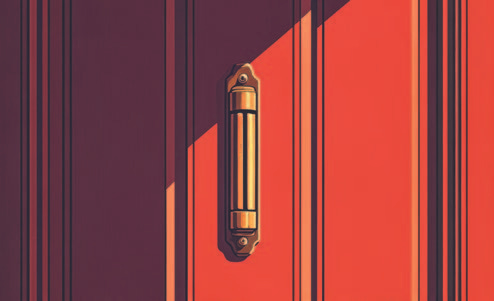Note
This article was originally published in The Bridge Magazine, Issue 8 (June/Sivan 2025/5785), the official publication of the European Union of Jewish Students (EUJS). The issue was titled "Courage."
It was written with a different audience in mind, so while it’s more concise than my usual writing here, the themes remain close to heart. I encourage you to explore their publications and learn more about their important work.
Courage is easy to applaud, yet difficult to define.
For Jews, it has never meant a blind leap into the unknown.
It begins in clarity—in knowing.
At Sinai, when our ancestors famously declared Naʿase veNishmaʿ¹ — “We will do, and we will listen” — they were not pledging blind obedience. That moment came after the sea split, after the plagues, after fire and thunder at the mountain. They had already seen too much to pretend this was guesswork. Their “yes” wasn’t reckless. It was rooted in something tested, experienced, undeniable.
Judaism is not a creed. It’s not about professing abstract blind “faith” the way modern language often suggests. The verse Shemaʿ Yisraʾel² — “Hear, O Israel” — is rendered in Arabic by Seʿadya haGaʾon³ (882–942), head of the Yeshiva of Sura, as eʿlam ya Yisraʾel: Know, O Israel. To know is a miṣva⁴ — a commandment. To study, to investigate, to wrestle with reality until one reaches a conviction strong enough to hold firm when crisis strikes.
Maimonides⁵ (1138–1204), in his Arabic Book of the Commandments, described the first commandment not as belief in God, but as iʿtiqād⁶ — a firm conviction grounded in reason. Not believing in something unseen, but recognizing something true and choosing to build your life upon it. First knowledge. Then loyalty. Then the inner steadiness we call biṭaḥon⁷.
That sequence still shapes Jewish life.
Across Europe, and now even in New York, vandals rip mezuzoth⁸ off Jewish students’ doorposts. Wood splinters. Screws hang. A small scar remains where covenant once touched timber. But the real rupture isn’t just physical. It’s in the forgetting of what the mezuza contains.
For many Jews, learning what’s written inside can be a turning point. It’s not just a scroll; it’s a blueprint. Shemaʿ, love God, teach your children, bind these words, write them, live them (Deḇarim 6:4–9; 11:13–21. Bemiḏbar 15:37–41.). These are not mystical instructions. They are a structure for memory, purpose, and resilience.
The blessing for affixing a mezuza uses the word liqboaʿ⁹ — to plant it, to set it firmly. But that strength doesn’t come from the act of placing it on the wall. It comes from understanding what it declares.
In that sense, the mezuza is not a symbol. It is a syllabus. And the courage it stirs comes not from ritual habit, but from grasping what it means. To know what the mezuza says is to know who we are. That knowledge generates a quiet courage stronger than intimidation.
Gather around a Shabbath meal with friends. Ask questions. Learn. Investigate. To learn who you are and who your people are is an act of Jewish courage.
Such firmness often goes unnoticed. None of these acts make headlines. But they echo Sinai’s logic: action rooted in understanding.
The tragedies of our time — including October 7, 2023 — did not begin the Jewish story, and they will not conclude it. They are ruptures, not definitions.
Our lineage stretches back to a people who believed the world is intelligible, that law can refine fear, and that loyalty must grow from understanding.
Jewish courage is not a reaction to catastrophe.
It was forged long before the crises that demand it, and it will outlast any single assault.
Judaism does not require submission, but engagement.
It invites us to wrestle with it: through study, memory, and tradition — tested against the world itself.
Torah → Emuna → Biṭaḥon
Knowledge → Conviction → Security
There is a pattern to Jewish resilience. Knowledge leads to loyalty, and loyalty leads to inner strength. Reverse the order, and conviction collapses. Preserve it, and even the smallest act can ripple through generations.
To remember clearly is already to stand tall.
When we know who we are, and what we have seen, courage follows almost naturally — like fruit follows seed.
In a time of noise, fear, and confusion, the task is not to shout louder, but to remember better.
Because when you know who you are, courage follows.
Footnotes
Naʿase veNishmaʿ: Literally, “We will do, and we will listen.” A declaration made at Sinai, often misread as blind obedience; in Jewish tradition, it reflects action rooted in understanding.
Shemaʿ Yisraʾel: One of the most important verses in the Bible within Judaism, often translated as “Hear, O Israel.” One of the first verses Jewish children are taught — a declaration of God’s unity and presence.
Seʿadya haGaʾon: A 10th-century Jewish philosopher and head of the great Talmudic academy of Sura. He was among the first to translate the Hebrew Bible into Arabic and defend Judaism through reason.
Miṣva: Often spelled “mitzva” and translated as “commandment,” but its deeper meaning is sacred responsibility — an act that ties intention to action.
Maimonides (Rambam): A 12th-century Jewish philosopher and legal scholar who emphasized reason and clarity in Jewish thought.
Iʿtiqād: An Arabic term used by Jewish philosophers writing in Arabic, meaning firm, reasoned conviction — truth built on logic and inquiry.
Biṭaḥon: Usually rendered as “trust” or “faith,” but more accurately “inner security” — a steadiness that comes from deep conviction, not surface-level confidence.
Mezuzoth / Mezuza: A small handwritten scroll placed in a case and affixed to the doorposts of Jewish homes. It contains passages from Deuteronomy that command love, memory, and teaching. Not a charm, but a declaration — the blueprint of Jewish life.
Liqboaʿ: The Hebrew verb used when affixing a mezuza — meaning to plant, to root it firmly and permanently.



